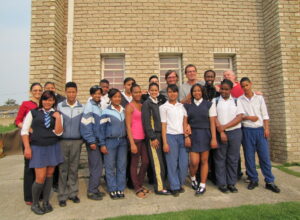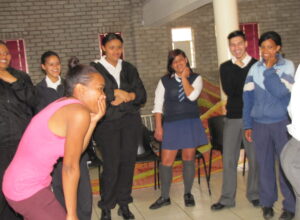Khulisa Integrated Youth Development Programme
The (SADRAT Institute) has developed a holistic integrated youth development programme based on its study conducted in the Nelson Mandela Metropole (Port Elizabeth) in the Eastern Cape of South Africa in 2003. This study was conducted in three different townships (Motherwell, Walmer and Kleinskool) and was designed to explore the well-being of the youth living in these areas; their skills level and leadership capacity among youth and to gather critical information on human health issues, especially related to HIV/AIDS. This information-gathering phase was followed by the tailoring of a programme designed to train youth leaders in six critical areas: career education, leadership, entrepreneurship, lifeskills, reproductive health, and sports, recreation and cultural activities. Some of those trained have gone on to positively influence other youth in their communities, creating a snowball effect. The whole process has been executed in each of the aforementioned communities under the guidance of a core working group comprising youth from the community concerned and representatives of key organizations.Since 2015 the Sadrat Institute has partnered with the School at Home Project.
The School at Home project is an initiative of a local church in Chatty, the Uniting Reformed Church, dating back to 2012. At its inception its primary objective was to create a safe space where grade 10 and 11 learners from the Chatty community could receive academic tutoring during the first week of the June school recess period. The project was prompted by a rapidly failing public school system, marked by overcrowded classrooms and inadequate teaching material, resulting in learner and teacher apathy, high rates of school failure and behavioural problems amongst learners. These behavioural challenges included a steady increase in adolescent drug use. Teachers from the community volunteered their recess time and expertise to offer much valued tutoring during the Winterschool Project (as it was named at the time). These tutoring sessions which was attended by learners in large numbers, were lauded for the following reasons: it equipped learners with a sense of mastery of academic material which increased their motivation; the teachers were warm and patient, offering their time and expertise to a group of learners who voluntarily attended “extra classes” during their holiday; the Winterschool committee comprising members from the church, not only ensured that there were warm meals daily, but also created a homely atmosphere by warmly welcoming the learners and being attuned to their needs. The parents of the learners expressed appreciation for the learners’ mastery of essential school material, as well as the fact that they were occupied during the day.
The Winterschool project continued and adopted a more holistic approach from 2014, which saw the inclusion of the following objectives:
- Promoting a culture of learning amongst learners (grade 10 & 11), by:
- Including life skills training focusing on:
- developing a vision and goals for the future
- effective time management [constructing a study time table; identifying and eliminating time wasters]
- reducing barriers to learning [creating a conducive study environment and a positive attitude to studying]
- a tour to the Nelson Mandela Metropolitan University where learners received an opportunity to:
- visualise themselves being students at a tertiary institution
- access first-hand information on educational pathways available at the NMMU
- familiarise themselves with the institution’s intellectual resources
- Including life skills training focusing on:
- Strengthening parental support for a culture of learning, by:
- Facilitating a parent training workshop on HOW to communicate with their adolescent learner
- Facilitating a dialogue between parents and learners where their needs of each other were communicated
- Celebrating and rewarding the learners commitment, by
- Hosting a certificate ceremony upon completion of the programme






